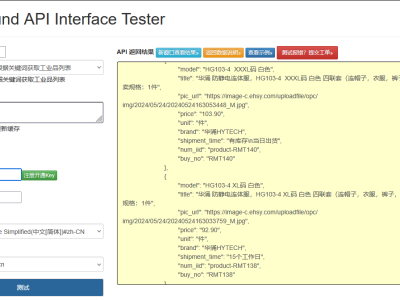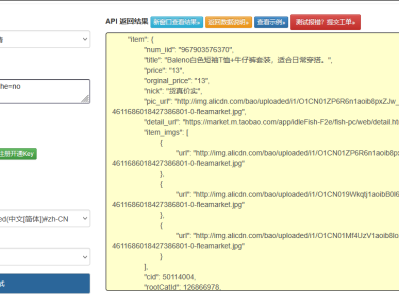孔夫子旧书网作为国内知名的古籍、二手书交易平台,其商品数据对于图书收藏、学术研究及二手书电商系统具有重要价值。本文将详细介绍孔夫子平台接口的调用方法,涵盖认证机制、搜索参数配置、数据解析及反爬策略,并提供可直接使用的 Python 代码实现,帮助开发者合规获取古籍和二手书数据。
一、孔夫子平台接口基础信息
孔夫子旧书网提供的开放接口主要包括图书搜索、商品详情、店铺信息等功能,其中/api/v1/books/search是获取图书列表的核心接口,特别适用于古籍、珍本、二手书的检索。
接口特点:
采用 API Key 认证机制,部分接口需要商业合作授权
支持按书名、作者、出版社、年代、品相等级等多维度筛选
包含古籍特有的版本信息、刻印年代、装帧形式等字段
提供卖家信誉、交易记录等二手书交易关键数据
接口端点:https://api.kongfz.com/api/v1/books/search
二、认证机制与核心参数
1. 认证方式
孔夫子接口采用简单直接的 API Key 认证:
在孔夫子开发者平台注册并申请应用,获取 API Key
在所有请求的 Header 中携带X-API-Key参数
商业用户可申请更高权限的 Secret Key 进行签名认证
2. 核心搜索参数
keyword:搜索关键字(书名、作者、ISBN 等,必填)
category:图书分类(古籍 / 二手书 / 期刊等,可选)
year_min/year_max:出版年代范围(可选)
condition:品相等级(1-10 级,10 为全新,可选)
price_min/price_max:价格区间(可选)
publisher:出版社(可选)
sort:排序方式(price_asc/price_desc/time_desc/credit_desc)
page:页码(默认 1)
limit:每页条数(1-20,默认 10)
rare:是否仅显示珍本(true/false,可选)
3. 响应数据结构
total:总结果数
page/limit:分页信息
books:图书列表数组
filters:可用筛选条件
三、完整代码实现
以下是 Python 实现的孔夫子旧书网图书搜索功能,包含 API 调用、数据解析和反爬策略:
import requests
import time
import random
from typing import Dict, List, Optional, Any
from user_agent import generate_user_agent
import logging
# 配置日志
logging.basicConfig(
level=logging.INFO,
format='%(asctime)s - %(levelname)s - %(message)s'
)
logger = logging.getLogger('kongfz_api')
class KongfzBookAPI:
def __init__(self, api_key: str, use_proxy: bool = False, proxy_pool: List[str] = None):
"""
初始化孔夫子旧书网API客户端
:param api_key: 平台申请的API Key
:param use_proxy: 是否使用代理
:param proxy_pool: 代理IP池列表
"""
self.api_key = api_key
self.base_url = "https://api.kongfz.com"
self.search_endpoint = "/api/v1/books/search"
self.detail_endpoint = "/api/v1/books/detail"
self.max_limit = 20 # 最大每页条数
self.use_proxy = use_proxy
self.proxy_pool = proxy_pool or []
self.session = self._init_session()
def _init_session(self) -> requests.Session:
"""初始化请求会话,配置持久连接"""
session = requests.Session()
session.headers.update({
"Accept": "application/json",
"Content-Type": "application/json",
"X-API-Key": self.api_key,
"Connection": "keep-alive"
})
return session
def _get_random_headers(self) -> Dict[str, str]:
"""生成随机请求头,降低反爬风险"""
return {
"User-Agent": generate_user_agent(),
"Accept-Language": random.choice(["zh-CN,zh;q=0.9", "zh-TW,zh;q=0.9,en;q=0.8"]),
"Referer": "https://www.kongfz.com/"
}
def _get_proxy(self) -> Optional[Dict[str, str]]:
"""从代理池获取随机代理"""
if self.use_proxy and self.proxy_pool:
proxy = random.choice(self.proxy_pool)
return {"http": proxy, "https": proxy}
return None
def search_books(self,
keyword: str,
category: Optional[str] = None,
year_min: Optional[int] = None,
year_max: Optional[int] = None,
condition: Optional[int] = None,
price_min: Optional[float] = None,
price_max: Optional[float] = None,
publisher: Optional[str] = None,
sort: str = "time_desc",
page: int = 1,
limit: int = 10) -> Dict[str, Any]:
"""
搜索孔夫子旧书网图书
:param keyword: 搜索关键字
:param category: 图书分类
:param year_min: 最小出版年份
:param year_max: 最大出版年份
:param condition: 品相等级(1-10)
:param price_min: 最低价格
:param price_max: 最高价格
:param publisher: 出版社
:param sort: 排序方式
:param page: 页码
:param limit: 每页条数
:return: 搜索结果
"""
# 限制每页最大条数
limit = min(limit, self.max_limit)
# 构建查询参数
params: Dict[str, Any] = {
"keyword": keyword,
"sort": sort,
"page": page,
"limit": limit
}
# 添加可选参数
if category:
params["category"] = category
if year_min is not None:
params["year_min"] = year_min
if year_max is not None:
params["year_max"] = year_max
if condition is not None:
params["condition"] = condition
if price_min is not None:
params["price_min"] = price_min
if price_max is not None:
params["price_max"] = price_max
if publisher:
params["publisher"] = publisher
# 准备请求配置
headers = self._get_random_headers()
proxy = self._get_proxy()
try:
# 随机延迟,模拟人类行为
time.sleep(random.uniform(0.8, 1.5))
# 发送请求
response = self.session.get(
f"{self.base_url}{self.search_endpoint}",
params=params,
headers=headers,
proxies=proxy,
timeout=15
)
response.raise_for_status()
# 解析响应
result = response.json()
# 处理API错误
if result.get("code") != 0:
logger.error(f"API错误: {result.get('msg')}")
return {
"success": False,
"error_code": result.get("code"),
"error_msg": result.get("msg")
}
# 解析搜索结果
return self._parse_search_result(result.get("data", {}))
except requests.exceptions.RequestException as e:
logger.error(f"请求异常: {str(e)}")
return {
"success": False,
"error_msg": f"请求异常: {str(e)}"
}
except Exception as e:
logger.error(f"处理响应失败: {str(e)}")
return {
"success": False,
"error_msg": f"处理响应失败: {str(e)}"
}
def _parse_search_result(self, raw_data: Dict[str, Any]) -> Dict[str, Any]:
"""解析搜索结果为结构化数据"""
# 分页信息
pagination = {
"total": raw_data.get("total", 0),
"page": raw_data.get("page", 1),
"limit": raw_data.get("limit", 10),
"pages": (raw_data.get("total", 0) + raw_data.get("limit", 10) - 1) //
raw_data.get("limit", 10)
}
# 解析图书列表
books = []
for item in raw_data.get("books", []):
# 处理古籍特有的版本信息
ancient_info = None
if item.get("is_ancient"):
ancient_info = {
"edition": item.get("ancient_edition"), # 版本
"engraving_year": item.get("engraving_year"), # 刻印年代
"binding": item.get("binding"), # 装帧
"seal_info": item.get("seal_info") # 钤印信息
}
books.append({
"book_id": item.get("id"),
"title": item.get("title"),
"author": item.get("author"),
"publisher": item.get("publisher"),
"publish_year": item.get("publish_year"),
"category": item.get("category"),
"is_ancient": item.get("is_ancient", False), # 是否古籍
"ancient_info": ancient_info,
"condition": {
"level": item.get("condition_level"), # 品相等级
"description": item.get("condition_desc") # 品相描述
},
"price": {
"current": item.get("price"),
"original": item.get("original_price"),
"currency": "CNY"
},
"seller": {
"id": item.get("seller_id"),
"name": item.get("seller_name"),
"credit": item.get("seller_credit"), # 信誉等级
"score": item.get("seller_score") # 好评率
},
"images": {
"main": item.get("main_image"),
"thumbnail": item.get("thumbnail")
},
"url": item.get("url"),
"tags": item.get("tags", [])
})
# 解析可用筛选条件
filters = self._parse_filters(raw_data.get("filters", {}))
return {
"success": True,
"pagination": pagination,
"books": books,
"filters": filters
}
def _parse_filters(self, raw_filters: Dict[str, Any]) -> Dict[str, Any]:
"""解析筛选条件"""
filters = {}
# 分类筛选
if "categories" in raw_filters:
filters["categories"] = [
{"id": item.get("id"), "name": item.get("name"), "count": item.get("count")}
for item in raw_filters["categories"]
]
# 品相筛选
if "conditions" in raw_filters:
filters["conditions"] = [
{"level": item.get("level"), "name": item.get("name"), "count": item.get("count")}
for item in raw_filters["conditions"]
]
# 年代筛选
if "years" in raw_filters:
filters["years"] = raw_filters["years"]
return filters
def batch_search(self,
keyword: str,
max_pages: int = 3,
**kwargs) -> Dict[str, Any]:
"""
批量获取多页搜索结果
:param keyword: 搜索关键字
:param max_pages: 最大获取页数
:param**kwargs: 其他搜索参数
:return: 合并的搜索结果
"""
all_books = []
current_page = 1
total_pages = 1
while current_page <= max_pages and current_page <= total_pages:
logger.info(f"搜索第 {current_page} 页,关键字: {keyword}")
# 搜索当前页
result = self.search_books(
keyword=keyword,
page=current_page,
**kwargs
)
if not result.get("success"):
return result
# 收集图书数据
all_books.extend(result.get("books", []))
# 更新分页信息
pagination = result.get("pagination", {})
total_pages = pagination.get("pages", 1)
# 准备下一页
current_page += 1
# 增加页数间隔,降低反爬风险
if current_page <= max_pages:
time.sleep(random.uniform(1.5, 2.5))
return {
"success": True,
"total_books": len(all_books),
"books": all_books,
"summary": {
"total_available": pagination.get("total", 0),
"fetched_pages": current_page - 1
}
}
# 使用示例
if __name__ == "__main__":
# 替换为你的API Key
API_KEY = "your_api_key"
# 代理配置(可选)
PROXY_POOL = [
# "http://ip1:port",
# "http://ip2:port"
]
# 初始化API客户端
kongfz_api = KongfzBookAPI(
api_key=API_KEY,
use_proxy=False, # 根据需要开启
proxy_pool=PROXY_POOL
)
# 示例1:搜索古籍
ancient_result = kongfz_api.search_books(
keyword="论语",
category="ancient", # 古籍分类
year_min=1949,
year_max=2023,
condition=8, # 8级及以上品相
sort="price_asc",
page=1,
limit=10
)
if ancient_result["success"]:
print(f"古籍搜索: 找到 {ancient_result['pagination']['total']} 本相关图书")
if ancient_result["books"]:
book = ancient_result["books"][0]
print(f"书名: {book['title']}")
print(f"作者: {book['author']}")
print(f"价格: {book['price']['current']}元")
print(f"品相: {book['condition']['level']}级 - {book['condition']['description']}")
if book["is_ancient"]:
print(f"版本: {book['ancient_info']['edition']}")
# 示例2:批量搜索二手书
# batch_result = kongfz_api.batch_search(
# keyword="鲁迅全集",
# category="secondhand", # 二手书分类
# price_min=50,
# price_max=500,
# max_pages=2
# )
#
# if batch_result["success"]:
# print(f"\n批量搜索: 共获取 {batch_result['total_books']} 本图书")
四、代码核心功能解析
1. 反爬策略实现
随机生成 User-Agent 和请求头,模拟不同浏览器行为
加入随机请求延迟,避免固定访问频率被识别
支持代理 IP 池配置,分散请求来源
使用持久化 Session,模拟正常用户浏览行为
2. 古籍数据特色处理
专门解析古籍特有的版本、刻印年代、装帧等信息
区分古籍与普通二手书的数据结构
提取钤印信息等古籍收藏关键维度
3. 搜索功能设计
支持完整的图书筛选参数,满足古籍和二手书的搜索需求
提供单页搜索和多页批量搜索两种模式
批量搜索时动态调整间隔时间,平衡效率与安全性
4. 数据结构化
按图书类型组织数据,区分普通二手书和古籍
提取卖家信誉、品相描述等二手交易关键信息
解析可用筛选条件,便于前端实现高级筛选功能
五、实战注意事项
1. 接口权限与申请
孔夫子 API 分为免费版和商业版,免费版有调用频率限制(通常 QPS≤2)
古籍珍本等敏感数据需要申请商业授权
个人开发者需提供身份证明,企业开发者需提供营业执照
2. 反爬与合规
免费版接口请勿进行高频次调用,建议单 IP 日调用不超过 1000 次
数据使用需遵守孔夫子平台的版权协议,不得用于商业竞品
尊重古籍数据的知识产权,引用时需注明来源
3. 搜索策略优化
古籍搜索建议结合年代和版本筛选,提高精准度
批量获取数据时,合理设置max_pages参数,避免触发限制
对稀缺古籍建立缓存机制,缓存周期建议 7-30 天
4. 数据处理建议
书名和作者可能存在异体字、通假字,需进行文字规范化处理
品相描述为文本信息,可通过 NLP 技术提取关键评价
出版年代可能存在模糊表述(如 "民国年间"),需特殊处理
六、功能扩展方向
开发古籍版本比对工具,基于多本同书数据进行版本差异分析
构建卖家信誉评估系统,结合历史交易和评价数据
实现图书价格趋势分析,追踪古籍市场价格波动
开发古籍修复需求识别功能,基于品相描述自动判断修复需求
————————————————
版权声明:本文为博主原创文章,遵循 CC 4.0 BY-SA 版权协议,转载请附上原文出处链接和本声明。
原文链接:https://blog.csdn.net/QQ569893796/article/details/150613653

